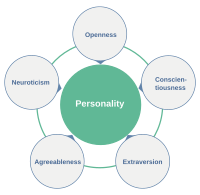
Photo from wikipedia
OBJECTIVE The aim: To investigate internal factors - neuroticism and extroversion, which can be predictors of emotional burnout syndrome and their prevalence among student youth. PATIENTS AND METHODS Materials and… Click to show full abstract
OBJECTIVE The aim: To investigate internal factors - neuroticism and extroversion, which can be predictors of emotional burnout syndrome and their prevalence among student youth. PATIENTS AND METHODS Materials and methods: Used a complex of methods: theoretical - theoretical analysis, synthesis, systematization; sociological method of questioning; empirical: observation, testing-Eysenck's methods for assessing the impact of neuroticism and externality; statistical. The object of the research is the process of influence of personal characteristics (individual factors) on the development and spread of EBS among students. Subject - personal characteristics (individual factors) of students - extraversion and neuroticism. The number of respondents was 610 students. RESULTS Results: A study of the personal characteristics of neuroticism and extraversion, which can be predictors in the genesis of EBS, was conducted. It has been established that several negative internal factors influence students. The significant prevalence of internal risk factors of EBS indicates the need for a comprehensive approach to its prevention and the need for the development and application of modern adequate methods, forms, and methods of prevention. CONCLUSION Conclusions: The presence and influence of internal factors on the development of EBS have been theoretically proven. It has been established that there is a significant propagation of personal characteristics that may have signs of negative internal factors. The need for preventive measures for the development of EBS among students has been revealed.
Journal Title: Wiadomosci lekarskie
Year Published: 2022
Link to full text (if available)
Share on Social Media: Sign Up to like & get
recommendations!